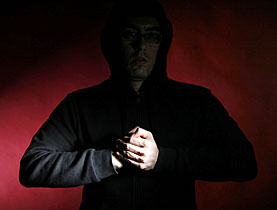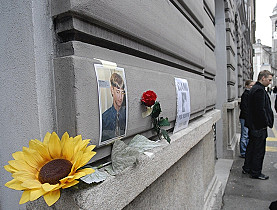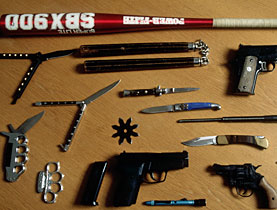Experts debate perceived rise in violence

Experts have been examining a public perception of rocketing violence at a conference at Lausanne University.
The forum aimed to shed light on a growing public concern. It was organised by canton Vaud in the aftermath of last year’s riots in Lausanne protesting against former cabinet minister Christoph Blocher, and youth violence in Yverdon.
“Violence concerns all of us… but before you can treat a patient, you need to know what they are suffering from,” Jacqueline de Quattro, head of the cantonal security and environment service, told a packed auditorium on Friday.
“It’s important to remind ourselves that violence is not specific to young people or foreigners and most people are not involved. We are talking about a small minority of troublemakers, but we need to tackle the problem.”
According to an opinion poll published last year, the Swiss are more violent than 20 years ago and tough measures are needed to rectify the situation. But experts are not so sure.
Jean-Luc Vez, director of the Federal Police Office, felt it was extremely difficult to paint a precise portrait of how violent Switzerland really is.
“If you look at the past 20 years, the trend is towards an increase, but if you look closer we see extremely varied pictures,” he told swissinfo.
To gain a clearer image, by 2010 the Federal Police Office plans to totally revise the way it gathers statistics on violence by harmonising criteria among the cantons. It also intends to carry out various studies, including one into repeat offenders, who are said to commit 40-60 per cent of all crime.
“My impression is that there is more violence,” said Alain Meister, president of Lausanne’s Youth Court. “Over the past five to six years we have seen more violent crimes and violence in general, more sexually related crimes, threatening behaviour and coercion, while damage to property remains stable and drug-related crime has fallen.”
Put in perspective
Criminologist Marcelo Aebi said there had been a slight increase over recent years, but when compared internationally he felt the Swiss were very peaceful people.
“Violence is a rare phenomenon and very few people are involved – around three per cent of the population,” he told swissinfo. “I don’t think Switzerland has to be worried about the current situation.”
The problem, said Aebi, is the media.
“It’s like when showing the result of a football match – you only see the goals and not the whole 90 minutes. It’s the same thing, you only see the serious acts of violence and you have the impression that you are surrounded by it, but it’s not true.”
Easier access to alcohol and drugs, pornography shared on mobile phones, violent computer games and fractured, isolated single-parent families were just some of the other causes put forward as being responsible for a rise in violence.
Sociologist Ueli Windisch felt the Swiss shouldn’t be afraid of confronting the issue of growing violence.
More confidence
“We have to have more confidence in our society and its values that we defend with intransigence,” he told the audience.
One problem is that certain “irresponsible” adults are passing on the very negative messages to their children, said Windisch, who is also a secondary school teacher.
“Someone talked earlier about youth violence being linked to the fact that a young person might not be able to find an apprenticeship or job,” he said.
“We have to show young people that they have possibilities in Switzerland that do not exist elsewhere. Young people shouldn’t wait at home for us to come and get them, they have to become actors rather than victims of this “no future” movement.”
Philippe Lavanchy, head of Lausanne’s youth protection service, echoed this sentiment, pointing the finger at society.
“For 20 years we’ve been stressing individualism. We have to realise some of the negative aspects of our economic development,” he said. “Do children really need telephones that can save photographs?”
swissinfo, Simon Bradley in Lausanne
14,045 youths (79.5% boys) were convicted of crimes in 2006, according to the Federal Statistics Office. The figure is up about 2,000 on 1999.
64.1% of youths convicted are of Swiss nationality.
The number of convictions for driving offences, attacks against people and property-related crimes has been on the increase since 1999. But the authorities recorded a drop in the number of drug-related offences.
While police figures show a doubling of reported violent youth crimes in the past eight years and the public perception is of rocketing youth violence, researchers believe the figures should be treated with caution.
Studies in Switzerland, Germany, the Netherlands and Sweden came to the same conclusions – that police statistics are inflated by a growing tendency to report crimes to the authorities compared with a few years ago.
Last September a violent youth demonstration took place in Lausanne during a visit to the city by controversial then Justice Minister Christoph Blocher of the rightwing Swiss People’s Party.
Up to 2,000 people took part in the protest, which police had to break up using tear gas. Around a dozen arrests were made.
Several violent incidents have hit the headlines in Yverdon, including a violent attack at the station in 2003, in which an 18 year old died. One local newspaper even ran an article last year entitled, “Is Yverdon the Bronx of French-speaking Switzerland?”

In compliance with the JTI standards
More: SWI swissinfo.ch certified by the Journalism Trust Initiative













You can find an overview of ongoing debates with our journalists here . Please join us!
If you want to start a conversation about a topic raised in this article or want to report factual errors, email us at english@swissinfo.ch.